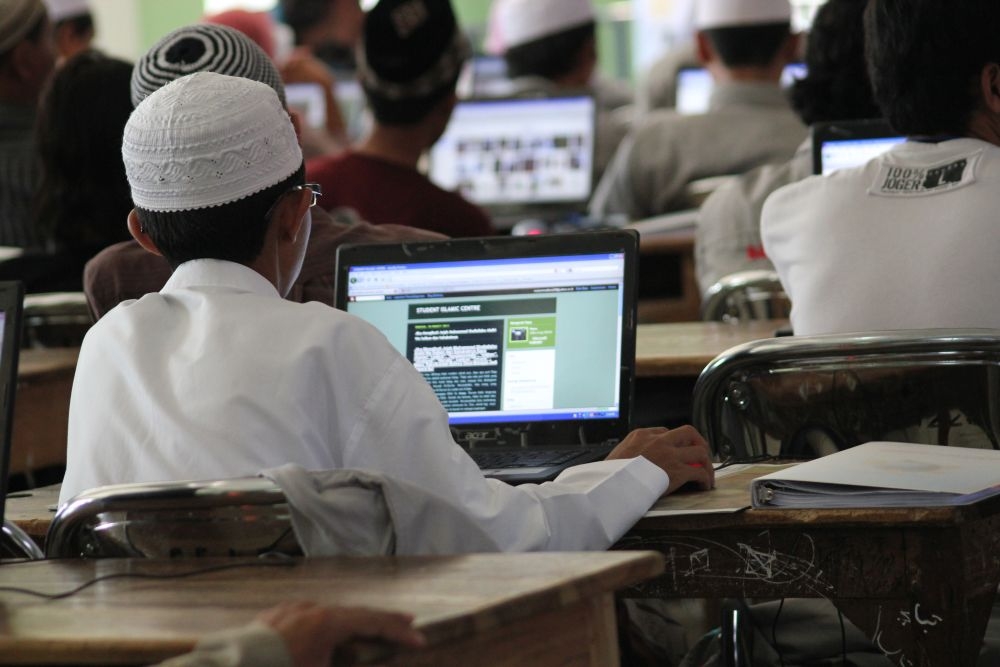Pesantren, as traditional Islamic educational institutions, have played a pivotal role in the religious and cultural development of Islam in Indonesia. They are vital in strengthening the faith and devotion of the Muslim community while preserving Islamic traditions.
Despite its longstanding presence, pesantren have faced numerous challenges, including the struggle for recognition as an indigenous educational institution. Today, pesantren are confronted with a new dilemma brought on by the rapid advancement of technology, which has reshaped every aspect of life, including public perceptions of these institutions. Pesantren now stand at a crossroads: either embrace a “new identity” in response to these developments or continue adhering strictly to their unique, traditional roots.

In reality, pesantren must adapt to technological advancements. While they serve as cultural strongholds from earlier times, ignoring technological progress risks leaving them far behind other educational systems. The integration of technology is essential for modernizing teaching methods and enhancing the management of pesantren. This ensures that pesantren can effectively engage with globalization and modernization, all while safeguarding the Islamic values and traditions they hold dear.
Historically, pesantren were places of self-cultivation, preparing individuals for leadership roles. However, in today’s technological era, they can no longer rely solely on teaching classical Islamic texts authored by the scholars of the past. To equip their students, pesantren must incorporate modern technology into their curricula, ensuring that santri (students) are not left technologically illiterate and can adapt to the demands of globalization. By combining contemporary issues with the classical teachings they study daily, santri are better prepared to navigate the modern world, where problems often cannot be addressed solely through traditional religious rulings.
Technology, designed to simplify human activities, should not be alien to pesantren. It offers great potential as a tool for good, and pesantren must distinguish between the beneficial and harmful aspects of technological innovation. Remaining resistant to technological advancements risks stagnation and irrelevance.
In Islamic legal principles (Ushul Fiqh), there is a well-known concept: al muhafadzatu ‘ala al-qadim as-shalih wa al-akhdzu bi al-jadid al-ashlah — to preserve beneficial traditions and adopt better new practices. This principle highlights the need for pesantren to modernize, not by altering their core ideologies but by merging their traditional values with modern technologies.
As Nurcholish Madjid once remarked in Bilik-bilik Pesantren, the ability of pesantren to face modernization will serve as a measure of their capacity to endure and remain relevant in the present age. If they can meet this challenge, they will emerge as institutions that are both modern and grounded in their original mission, avoiding the pitfalls of obsolescence.
Technology can also play a crucial role in improving the financial and administrative management of pesantren. By using financial management tools and systems, pesantren can streamline the organization of funds and activities, optimizing resources and reducing errors in financial oversight.
Nevertheless, the incorporation of technology must be done with care and wisdom. Pesantren need to ensure that technology does not compromise their Islamic values and traditions, nor should it replace the core principles of Islamic education. Instead, technology should be used to reinforce these values.
There are potential risks that come with technological advancements, such as addiction or misuse of social media. Thus, pesantren must also educate their students on the responsible and ethical use of technology.
Another critical aspect of adapting to technological advancements is the development of human resources. Pesantren must ensure that their graduates are technologically proficient and equipped with the skills necessary to face contemporary global challenges. Therefore, the education provided in pesantren must be both high-quality and relevant to current needs. Collaborative efforts with other educational institutions or industries can support pesantren in offering training and education that prepares their students for the modern workforce and contributes positively to society.
To effectively leverage technology in education, pesantren must also ensure that their infrastructure is up to standard. Reliable internet access, suitable computer and mobile devices, and safe, comfortable classrooms and dormitories are essential for supporting the use of technology in learning. These investments in infrastructure will further enhance the overall educational experience.
Pesantren play a significant role in developing the potential of their students. Beyond religious instruction, they must equip santri with skills and knowledge to meet global challenges. Holistic education that fosters spiritual, intellectual, emotional, and social growth is essential for pesantren to fully realize the potential of their students.
Technology can make education more interactive and engaging, providing students with broader access to information. This, in turn, aids the intellectual development of santri. Moreover, pesantren have the potential to become centers of economic activity that benefit local communities. Many pesantren are already engaged in producing goods such as food products, handicrafts, and offering educational services. Utilizing technology to offer training in entrepreneurship, business management, and information technology could help students and the local community alike develop economic opportunities and contribute to the national economy. This approach will also identify santri with entrepreneurial talents capable of navigating the forces of globalization.
By embracing technology while staying rooted in their values, pesantren can continue to be a guiding force in both the spiritual and worldly development of their students, ensuring that they remain relevant and influential in the modern era.






